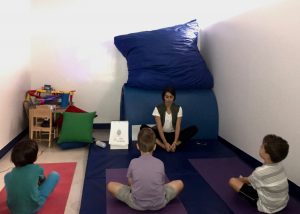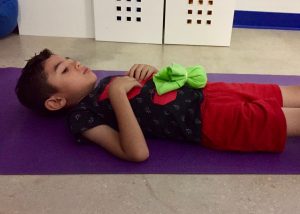It’s hard to go anywhere these days without spotting someone with a rolled-up yoga mat under an arm. Yoga’s popularity continues to rise as more and more people discover its positive effects on the body, mind, and spirit.
But the benefits of yoga don’t stop there.
We recently brought a new speech-language pathologist on board at Integrated Children’s Therapy, Jacki Rubin, CF-SLP, who is certified in “Creative Relaxation® Yoga Therapy for Children with Autism and Special Needs.”
Jacki’s daily yoga classes at our Engines at Play summer camp quickly became a favorite activity, one that our campers look forward to every day. We’ve watched in wonder as they’ve reaped the benefits of yoga in countless ways.
We sat down with Jacki to talk about why yoga is such a powerful tool for kids with speech, language, and social challenges.
Calm Body & Mind
It’s common for language and social challenges to occur alongside sensory regulation issues. “The world moves so fast around children who struggle with sensory regulation,” Jacki says. “Yoga helps calm their bodies and minds, which allows for more spontaneous speech. When you’re unregulated, it’s harder to access language.”
It’s also hard to be still. At the end of every class, Jacki uses a guided meditation involving imagining you are floating on a cloud. During this meditation, the children “stay completely still for multiple minutes,” Jacki says.
Emotional Regulation
Learning to be still compliments the work we’re doing throughout the summer to teach our campers emotional regulation skills. Jacki teaches the children how to relax by focusing on their breath. She places “breathing buddies”— small, soft objects made by the kids — on their bellies to help them pay attention to the rise and fall as they breathe.
Another technique is “huh breath.” This focused breathing helps the children relax by shifting awareness during a heightened emotional state. Remarkably, Jacki sees the kids using this outside of yoga class. When they’re upset or hyper, she says, they say, “Let’s do huh breath!”
Language Skills
Aside from calming strategies, yoga offers endless opportunities for language learning. In class, Jacki explains, the children “take trips via airplane to cities around the world and pretend to be animals, trees, and bugs.” These poses support language skills like using imagination, imitation, listening, acquiring new vocabulary, following directions, and understanding concepts such as up/down and left/right.
Yoga also offers a unique opportunity to teach both sequencing and being flexible when something unexpected happens. Because the poses are done in the same order during each class, the children get to practice the important skill of using memory for sequencing steps. By doing a pose out of order every once in a while, Jacki helps the kids learn that sometimes what you expect changes, and you can adapt to that.
Social Communication
Navigating the social world can be hard for kids with speech, language and other developmental challenges. Yoga offers gentle ways to practice relating to others. “To encourage social interaction and improve social competence,” Jacki says, “the children can participate in see-saw pose. They partner up with a peer, hold hands, and rock back and forth. Some days, I encourage them to hold eye contact for the duration of the pose.”
Yoga also reinforces the concept of personal space. “They learn that this is my mat, and that’s your mat, and I respect your space by staying on my mat,” Jacki says.
Yoga for Your Child
If you have a 5 to 8 year-old child with speech, language or social challenges, we welcome him or her to experience the joy and benefits of yoga during our 6-week class starting September 6th. The class will meet every Wednesday from 4:00-4:45 p.m. at our facility. You can find more information about the class and how to register here.




Recent Comments